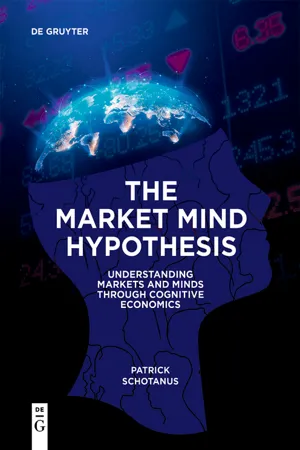
The Market Mind Hypothesis
Understanding Markets and Minds Through Cognitive Economics
- 493 pages
- English
- ePUB (mobile friendly)
- Available on iOS & Android
The Market Mind Hypothesis
Understanding Markets and Minds Through Cognitive Economics
About this book
What is economics' missing link? Recent economic crises have had a devastating impact on society. Worryingly, they gravely risked a collapse of the financial system. These crises also painfully revealed economics' blind spots. Crucially, economics is not an innocent bystander but central to the problem.
In this pioneering book, Patrick Schotanus explains that economics' mechanical worldview is the ontological error which leads to flawed thinking and faulty practices. The Market Mind Hypothesis (MMH) thus calls it "mechanical economics": it not only erroneously views but also dangerously treats the economy as a machine, the market as an automaton, and its agents as robots. Inspired by heterodox economic and leading cognitive thinkers, this book offers an alternative paradigm. Central to MMH's psychophysical worldview is the fact that consumers, investors, and other participants are conscious beings and that their minds' extension makes consciousness a reality in markets, exemplified by market mood. Specifically, denial of the complex mind~matter exchanges as the essence of markets means the extended mind~body problem is economics' elephant in the room.
The book argues that if mechanical economics is the answer, we have been asking the wrong questions. Moreover, we will not solve our economic predicaments by doubling down on the assumption of rationality, nor by identifying yet another behavioural bias. Instead, scholars and students of economics and finance as well as finance practitioners need to investigate—through cognitive economics—the deep links between markets and minds to better understand both.
With a foreword by investment strategist Russell Napier, an intermezzo by neuroscientist and complexity pioneer Scott Kelso, and an afterword by 4E cognition philosopher Julian Kiverstein.
Frequently asked questions
- Essential is ideal for learners and professionals who enjoy exploring a wide range of subjects. Access the Essential Library with 800,000+ trusted titles and best-sellers across business, personal growth, and the humanities. Includes unlimited reading time and Standard Read Aloud voice.
- Complete: Perfect for advanced learners and researchers needing full, unrestricted access. Unlock 1.4M+ books across hundreds of subjects, including academic and specialized titles. The Complete Plan also includes advanced features like Premium Read Aloud and Research Assistant.
Please note we cannot support devices running on iOS 13 and Android 7 or earlier. Learn more about using the app.
Information
Table of contents
- Title Page
- Copyright
- Contents
- Advance Praise for The Market Mind Hypothesis: Understanding Markets and Minds Through Cognitive Economics
- Acknowledgements
- Prologue
- Introduction: Opening a Can of Worms from Pandora’s Box
- Background and Motivation: Mr Market and Me
- Chapter 1 Setting the Stage: Who Am I?
- Chapter 2 On Ontology: Am I Evil?
- Chapter 3 On Theory: Am I Right?
- Chapter 4 On Epistemology: Am I Lucky?
- Chapter 5 On Methodology: Am I Healthy?
- Chapter 6 On Complexity: Am I Emerging?
- Intermezzo: Parallels Between Mind and Market. What is Mind? What is Market?
- Chapter 7 On Discovery: Am I Free?
- Chapter 8 On Portfolios: Am I Balanced?
- Chapter 9 On Empiricals: Am I Verifiable?
- Chapter 10 On the Hard Problem: Am I Conscious?
- Chapter 11 On the Worst Case: Am I Breaking Down?
- Chapter 12 On Closure: Farewell and Good Luck
- Afterword: The Market Mind Hypothesis and 4E Cognitive Science: A Post-Cognitivist Approach to Cognitive Economics
- Abbreviations and Glossary
- Appendix 1Bridging Concepts and Terms
- Appendix 2Research Manifesto
- References
- Index